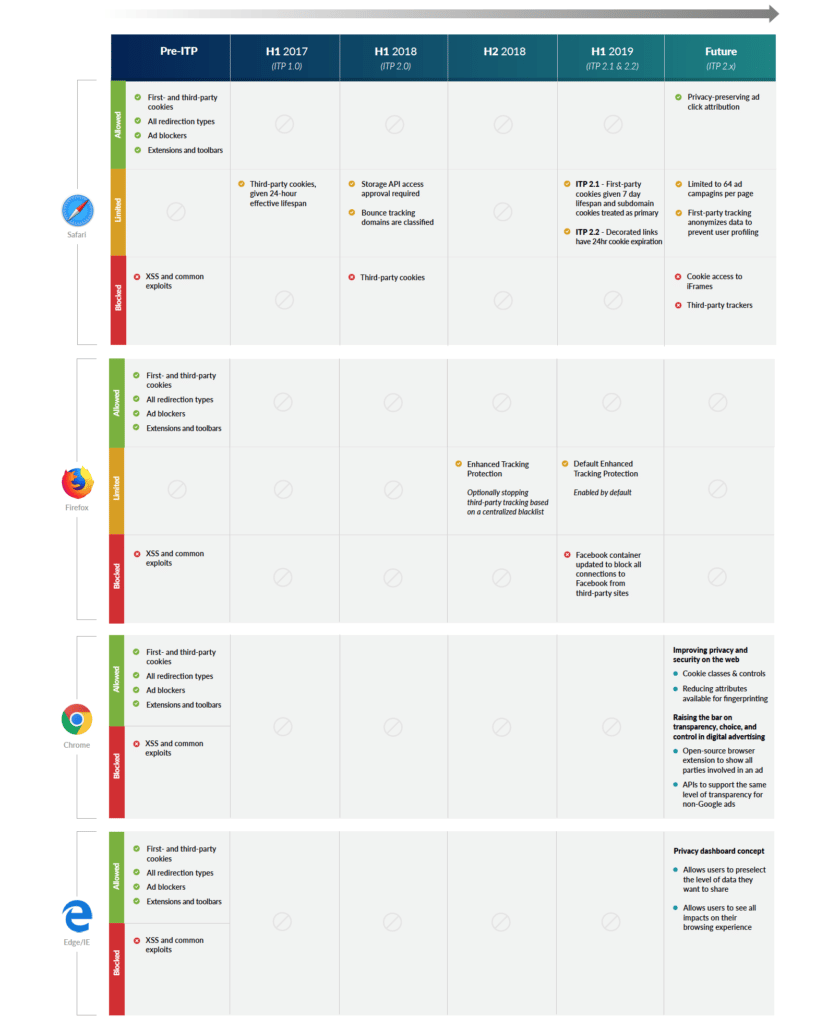
Digital marketers have been freaking out for the past year, and for good reason: the tracking methods they know and love are dead. Which is exactly why we have spent the last few months at TUNE building a solution that can solve for Apple’s Intelligent Tracking Prevention 2.2 through ITP “3.0” for Safari, Mozilla’s Enhanced Tracking Prevention for Firefox, Google’s SameSite cookie tracking updates on Chrome, and others.
In this post, I’ll review the current state of online ad tracking and how we got here, as well as explain how digital advertisers can protect themselves against future disruptions in browser tracking methods.
The State of Online Tracking
Apple users are the highest value users. There, I said it.
It’s true. It has been studied and known in performance marketing circles since the mobile boom really kicked off. If a brand wants to earn, and an advertiser wants reliable lifetime value, they target iPhones and Macs. Removing the ability to track the attributes of these users, carts, page views, clicks, and conversions will measurably affect the business of advertising as a whole. But it will also measurably improve the lives of users. By centrally managing the consent process, blocking analytics systems and trackers that provide poor customer experiences, and limiting the number of ads per page, Apple will create a fast, efficient, redirect-less web experience that users will love.
Cookies are gone. Link decoration is out, too. Third-party ad tracking is significantly hindered. But the almighty user is happy. As with everything, the pendulum will swing until a middle ground is found.
For years, online retailers and tech giants have prioritized profits and user experience over user privacy. Now, users demand the quality experience, and markets continue to demand the profits, with the added need to protect users.
The table below paints a very telling picture. Apple has launched major privacy releases for the Safari browser in three of the last four half-year periods since 2017. These releases are clearly in line with Apple’s strategy for driving Safari adoption, which applies greater pressure on Google’s and Facebook’s ad revenues. It also allows Apple to get more value from its resources.

What is Apple’s eventual goal? It’s hard to say, but the road to it will be a very difficult ride for the martech and adtech ecosystem.
How Online Advertising and ITP 2.2 Can Coexist
On a practical level, today all HTML notification methods (ping, beacon, redirection, XHR) are rendered unusable for tracking. Cookies are also unusable for tracking and most other purposes beyond session storage, which is their original intent. This is the direct result of browser updates like Apple’s ITP 2.2, which push all of the technical heavy lifting of digital advertising up a level to the behavior layer, where technologies like JavaScript can still be used to achieve a marketer’s goals.
At TUNE, we have released a cookieless tracking solution that works at this layer to add easy storage and data access. This snippet will work in browsers only across both mobile and desktop web; postback tracking remains the standard for mobile apps. Our hope is that this solution will allow less sophisticated platforms and the advertisers who use them to understand their users and traffic sources.
However, it should be noted that over the long term, we expect session attribution methods will be blocked for most browsers. This will be an ongoing evolution of tracking that we at TUNE are committed to stay aware of and release tools for.
Learn More
TUNE Cookieless Tracking is now available for TUNE Partner Marketing Platform customers. If you are a TUNE customer, please contact your customer success manager for more information.
If you are not using TUNE today, please contact our sales team at [email protected].
Author
Becky is the Senior Content Marketing Manager at TUNE. Before TUNE, she handled content strategy and marketing communications at several tech startups in the Bay Area. Becky received her bachelor's degree in English from Wake Forest University. After a decade in San Francisco and Seattle, she has returned home to Charleston, SC, where you can find her strolling through Hampton Park with her pup and enjoying the simple things in life.



Leave a Reply
You must be logged in to post a comment.